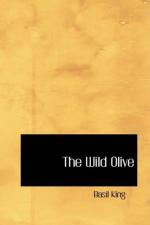This was a little, clean-shaven man, in the neighborhood of sixty, always dressed at sea as he probably dressed on shore. He wore nothing but black, with a white shirt and a ready-made black bow-tie. He might have been a butler, an elderly valet, or a member of some discreet religious order in street costume. Ford had heard a flippant young Frenchman speak of him as an “ancien curA(C), qui a fait quelque bAªtise”; and indeed there was about him that stamp of the ecclesiastic which is sometimes ineffaceable.
“I call myself Durand,” he said to Ford, using the conveniently ambiguous French idiom, “je m’appelle Durand.”
“Et je m’appelle Strange, I call myself Strange,” Ford had replied, claiming the name for the first time without hesitation, but feeling the irrevocable nature of the words as soon as he had uttered them.
Out of the crowd of second-rate Europeans of all races who made up the second cabin, the man who called himself Strange had selected the man who called himself Durand by some obscure instinct of affinity. “He looks like an old chap who could give one information,” was Strange’s own way of putting it, not caring to confess that he was feeling after a bit of sympathy. But the give and take of information became the basis of their friendship, and imparted the first real stimulus to the young man’s awkward efforts to use his mind.
Monsieur Durand had been thirty years in the Argentine, observing the place and the people, native and foreign, with the impartial shrewdness only possible to one who sought little for himself. It was a pleasure to share the fruits of his experience with one so eager to learn, for young men were not in the habit of showing him deference. He could tell Mr. Strange many things that would be to his advantage—what to do—what to avoid—what sort of place to live in—what he ought to pay—and what sort of company to keep.
Yes, he knew the firm of Stephens and Jarrott—an excellent house. There was no Mr. Stephens now, only a Mr. Jarrott. Mr. Stephens had belonged to the great days of American enterprise in the southern hemisphere, to the time of Wheelwright, and Halsey, and Hale. The Civil War had put an end to that. Mr. Jarrott had come later—a good man, not generally understood. He had suffered a great loss a few years ago in the death of his brother-in-law and partner, Mr. Colfax. Mrs. Colfax, a pretty little woman, who hadn’t old age in her blood either—one could see that—had gone back to the United States with her child—but a child!—blond as an angel—altogether darling—tout A fait mignonne. Monsieur Durand thought he remembered hearing that Mrs. Colfax had married again, but he couldn’t say for certain. What would you? One heard so many things. He knew less of the family since the last boy died—the boy to whom he gave lessons in Spanish and French. Death hadn’t spared the household—taking the three sons one after another and leaving father and mother alone. It was a thousand pities Mrs. Colfax had taken the little girl away. They loved her as if she had been their own—especially after the boys died. An excellent house! Mr. Strange couldn’t do better than seek an entry there—it is I who tell you so—c’est moi qui vous le dis.




